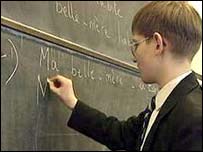|
Take-up of foreign languages at GCSE is declining so fast it has "reached the point of no return", a head teachers' union leader has warned.
Entries this summer in German were down by 14.2%, while French declined by 13.2% and Spanish by 0.5%.
John Dunford of the Association of School and College Leaders said the subjects were in "freefall".
GCSE languages were made non-compulsory in England in 2004. Efforts are being made to raise take-up at primary level.
For the second year in a row, French showed the biggest decline among the major GCSE subjects - those with 100,000 or more entries.
It was taken by 236,189 students, compared with 272,140 last year.
RE and history up
German fell through the 100,000 barrier to 90,311 and Spanish was down to 62,143.
The biggest riser among major subjects was religious studies - up 8.2%, followed by ICT and PE (up 6%), history (up 1.9%) and maths (up 1.2%).
Among the subjects with fewer than 100,000 entries, statistics was up 32.9% and media, film and TV studies 25.9%.
Mr Dunford said many students were choosing the latter instead of languages as it was seen as an "easier" option.
But Ellie Johnson Searle, director of the Joint Council for Qualifications,which issues the results for the exam boards, said of media studies: "This is less than 10% of the number doing maths and English.
"What we are looking at here is students being fitted for courses."
"They are also doing a number of other GCSEs and it's important that they have a broad range of qualifications."
But she added: "Any fall in language take-up like that must be a cause for concern to everybody."
Brighter pupils were still gravitating towards foreign languages, Dr Johnson Searle said.
'Finding new ways'
However, Dr Dunford said: "Fourteen-year-olds are disadvantaging themselves in the job market by giving up languages and the number of language teachers is declining.
"I think we have now passed the point of no return for languages in secondary schools.
"Schools need to find new ways of teaching languages other than just GCSEs."
He said more people had to start learning languages after the age of 16 and that schools had to introduce them in a more informal way, such as two-week full-time courses at the end of the academic year.
The government is making efforts to increase interest in subjects such as French and German among primary school pupils.
It is hoped this will increase participation at GCSE in a few years' time.
Steve Sinnott, general secretary of the National Union of Teachers, said languages had to be made compulsory again.
He also said he feared the primary school focus could "narrow" the range taught at secondary level to mainly French.
Mr Sinnott added: "Subjects like Portuguese and Spanish are globally important languages. There's been a lot of interest in Mandarin in recent years as well."
"I hope the primary school strategy doesn't mean there's simply a continuum of French learning and little else."
'Disappointing'
Education Secretary Alan Johnson said: "French continues to be in the top 10 most popular subjects but the overall decline in entries for languages, although not wholly unexpected, is disappointing."
"We have taken a sensible approach to what will make language learning thrive."
"It is not about forcing young people to study a language; it is about starting in primary schools, finding new and exciting ways of teaching languages and better supporting those who show an aptitude for the subject."
"The early signs are encouraging and I am confident that these changes will deliver a new generation of linguists."
Rise of media studies
This year, there were increases in the numbers who sat separate physics, chemistry and biology - all up more than 6% in popularity.
The CBI has called for more students to study separate sciences, rather than the mixed "double award", which counts as two GCSEs, taken by most.
There was a 3% falling off in double award entries to 959,578 - which equates to half that number of people doing the subject.
Chemistry and physics were overtaken by media, film and TV studies for the first time.
Its entries totalled 57,521 - compared with 56,035 for physics and 56,764 for chemistry.
|







